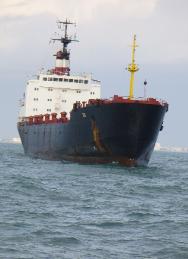
We have written and obtained approval of vessel security plans (VSP) for a number of clients.
We conducted the vessel security assessment (VSA), too. And we are also providing security
training and acting as exercise master for several clients.
We have been selected by the Liberian Flag administration to conduct International Ship and Port
Facility Security (ISPS) Code audits on their vessels. We are empowered to issue or endorse the
International Ship Security Certificate (ISSC) on behalf of Liberia upon the vessel's satisfactory
completion of the audit.
We conducted the vessel security assessment (VSA), too. And we are also providing security
training and acting as exercise master for several clients.
We have been selected by the Liberian Flag administration to conduct International Ship and Port
Facility Security (ISPS) Code audits on their vessels. We are empowered to issue or endorse the
International Ship Security Certificate (ISSC) on behalf of Liberia upon the vessel's satisfactory
completion of the audit.
US flag vessel and facility exercises must be done each calendar year, but not more than 18
months between two exercises. See Title 33 Code of Federal Regulations, 103.515, 104.230,
105.220, or 106.225.
Your Exercises Must Meet 10 Objectives
The annual security exercise should validate the adequacy of your response to changes in
MARSEC Levels, procedures for interfacing with facilities and other vessels, communications and
seven other areas from your security plan.
How We Can Help
Our Qualifications
Training
Marine Safety Program, US Coast Guard
Marine Industry, Armstrong Marine Consulting
months between two exercises. See Title 33 Code of Federal Regulations, 103.515, 104.230,
105.220, or 106.225.
Your Exercises Must Meet 10 Objectives
The annual security exercise should validate the adequacy of your response to changes in
MARSEC Levels, procedures for interfacing with facilities and other vessels, communications and
seven other areas from your security plan.
How We Can Help
- We will put together the scenario outline and draw up the scenario key activity action points for
the participants. - We will work to include your local US Coast Guard and law enforcement organizations in the
exercise. - We will attend the exercise to act as the exercise master.
- As the scenario unfolds, we will use training opportunities that present themselves to further
your managers' and crew’s understanding of your security plan and their actions under it.
Our Qualifications
Training
- Port Security/Law Enforcement Course, US Coast Guard
- Military Readiness Planning Course, US Coast Guard
- Individual Terrorism Awareness Course, US Army
- ISO 9000 Internal Auditor Course, University of South Florida
- International Ship and Port Security Code Auditor Course, Liberia International Ship and
Corporate Registry - International Safety Management Auditor Course, Liberia International Ship and Corporate
Registry
Marine Safety Program, US Coast Guard
- Port Safety Department, Marine Safety Office San Francisco
- Chief, Port Safety Department, Marine Safety Office Guam
- Contingency Planning Officer (war planning), Commandant (G-MP), Washington, DC
- Industry Training Sabbatical, United States Lines
Marine Industry, Armstrong Marine Consulting
- ISM/ISPS Codes Auditor and Nautical Inspector, Republic of Liberia
- Nautical Inspector, Republic of the Marshall Islands
- Safety Training Manual, emergency duties and ongoing training program for non-US flag
passenger ships - Oil Transfer Procedures
- SOPEPs
- Non-Tank Vessel Response Plans
- Fire and abandon ship drill training for foreign flag vessels experiencing difficulty with or failing
US Coast Guard port state control drills.
| Watch for any vessel or individual operating in a suspicious manner:
Be aware of activity around sensitive locations, such as:
Call the US Coast Guard National Response Center at (800) 424- 8802 to report any suspicious activity. |

| Security |
Armstrong Marine Consulting
Vessel surveys and inspections
US Coast Guard regulations
Sub M, ISM & ISPS Audits
Vessel surveys and inspections
US Coast Guard regulations
Sub M, ISM & ISPS Audits
- Consulting
- Analysis
- Surveys
- Advice